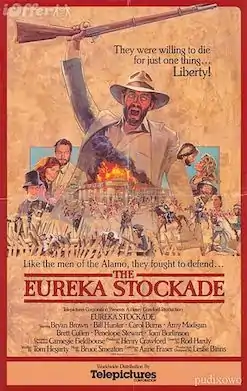Eureka Stockade (miniseries)
Eureka Stockade is a 1984 Australian miniseries based on the battle of Eureka Stockade.[1] It reunited the producer, writer and star of A Town Like Alice.
| Eureka Stockade | |
|---|---|
 | |
| Genre | historical |
| Written by | Tom Hegarty |
| Directed by | Rod Hardy |
| Starring | Bryan Brown Bill Hunter Carol Burns Amy Madigan Tom Burlinson |
| Country of origin | Australia |
| Original language | English |
| No. of episodes | 3 x 2 hours |
| Production | |
| Producer | Hector Crawford |
| Production company | Crawfords |
| Budget | $2.5 million[1][2] |
| Release | |
| Original network | Channel Seven |
| Original release | 27 March 1984 |
Cast
- Bryan Brown - Peter Lalor
- Bill Hunter - Timothy Hayes
- Carol Burns - Anastasia Hayes
- Amy Madigan - Sarah Jamieson
- Tom Burlinson - Father Smythe
- Brett Cullen - Charles Ross
- Penelope Stewart as Alicia Dunne
- Stephen Hayes as Johan Gregorious
- Rod Mullinar as Vern
- Tim Hughes as Sgt. Major Tyler
- Roger L. Howell as Raffaello Carboni
- Edwin Hodgeman as Commissioner Rede
- David Ravenswood as Sir Charles Hotham
- Fred Steele as John Joseph
- Simon Chilvers as Bishop Goold
- John Murphy as Father Downing
- Tommy Dysart as Tom Kennedy
- Peter Crossley as Johnstone
- Sam Petersen as Johnny Hayes
- Reg Evans as Goodenough
- Luke Gallagher as 'Starry' Hayes
- Troy Ellis as William Hayes
- Melissa Crawford as Annie Hayes
- James Crawford as Timmy Hayes
- David Bradshaw as Sgt. Major Milne
- John Larking as Bentley
- Roger Oakley as Scobie
- Peter Collingwood as General Nickle
- Geoff Warren as Dr. Kenworthy
- Edward Caddick as Father Dunne
- Peter Curtin as Attorney General
- Lee James as Aspinall
- Ruth Yaffe as Mrs. Bentley
- Victor Kazan as John D'Ewes
- Chris Hession as James McGill
- William Zappa as Flash Burke
- Bruce Knappett as Peter Martin
- Andrew Martin as Hummfray
- Chris Hallam as Dr. D.J. Williams
- Tim Hardiman as Barnard Welch
- Anthony Hawkins as Dr. Stewart
- Peter Green as Patrick Carroll
- Frank Thring as Judge
Production
The series was researched over two years and filmed over four months.[2] It was shot on location near Ballarat and Bendigo.[3] It was a difficult shoot as it took place during a heatwave. A $250,000 set of the British camp was almost destroyed during the Ash Wednesday bushfires.[2] A Eureka flag was stolen during filming.[4]
Reception
The series was a ratings disappointment compared to A Town Like Alice. However it sold widely overseas and screened in the US.[5][6]
References
- Ed. Scott Murray, Australia on the Small Screen 1970-1995, Oxford Uni Press, 1996 p192
- "'Eureka: months of filming cost $2.5m". The Canberra Times. 58 (17, 781). Australian Capital Territory, Australia. 4 June 1984. p. 21. Retrieved 9 October 2019 – via National Library of Australia.
- "Historic flag to survive in Ballarat". The Canberra Times. 58 (17, 788). Australian Capital Territory, Australia. 11 June 1984. p. 25. Retrieved 9 October 2019 – via National Library of Australia.
- "Eureka flag theft halts film". The Canberra Times. 57 (17, 295). Australian Capital Territory, Australia. 4 February 1983. p. 10. Retrieved 9 October 2019 – via National Library of Australia.
- Review from New York Times accessed 3 August 2013
- Albert Moran, Moran's Guide to Australian TV Series, AFTRS 1993 p 166
This article is issued from Wikipedia. The text is licensed under Creative Commons - Attribution - Sharealike. Additional terms may apply for the media files.